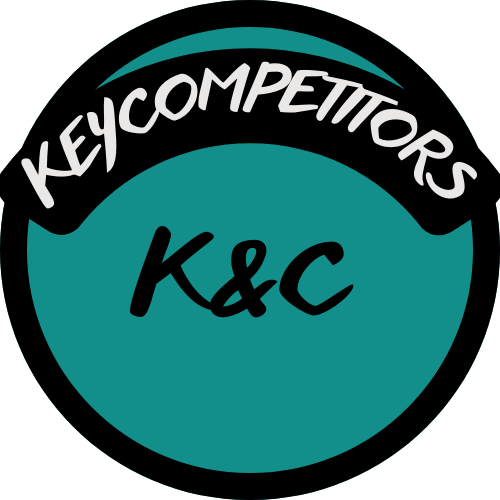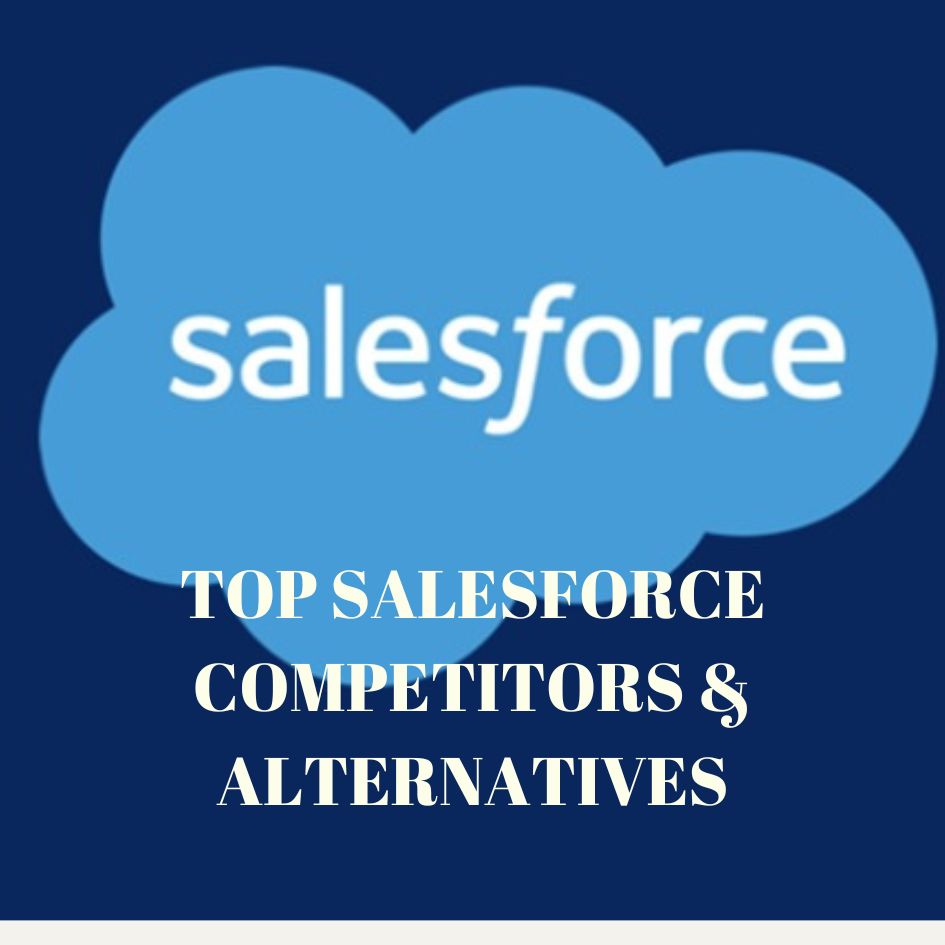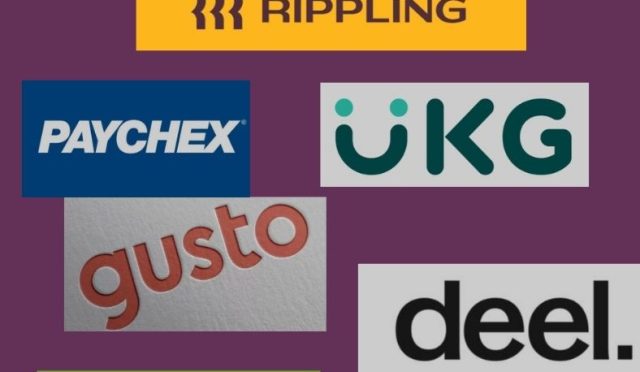In today’s rapidly evolving digital landscape, Customer Relationship Management (CRM) platforms have become essential tools for businesses of all sizes. Salesforce, a pioneer in cloud-based CRM solutions, faces significant competition from various platforms. Understanding the strengths and weaknesses of Salesforce competitors is crucial for businesses choosing their CRM solutions and investors monitoring the dynamic CRM market.
Salesforce and The Power of Customer Relationship Management
Salesforce has transformed the CRM industry by providing a comprehensive cloud-based platform designed to manage customer interactions, sales, marketing, and customer service seamlessly. Its success has sparked intense competition, with numerous companies offering alternative solutions tailored to different business needs.
Key Salesforce Competitors Analysis
Below is a detailed analysis of prominent Salesforce competitors, examining their features, market presence, strengths, and weaknesses:
Competitor Overview
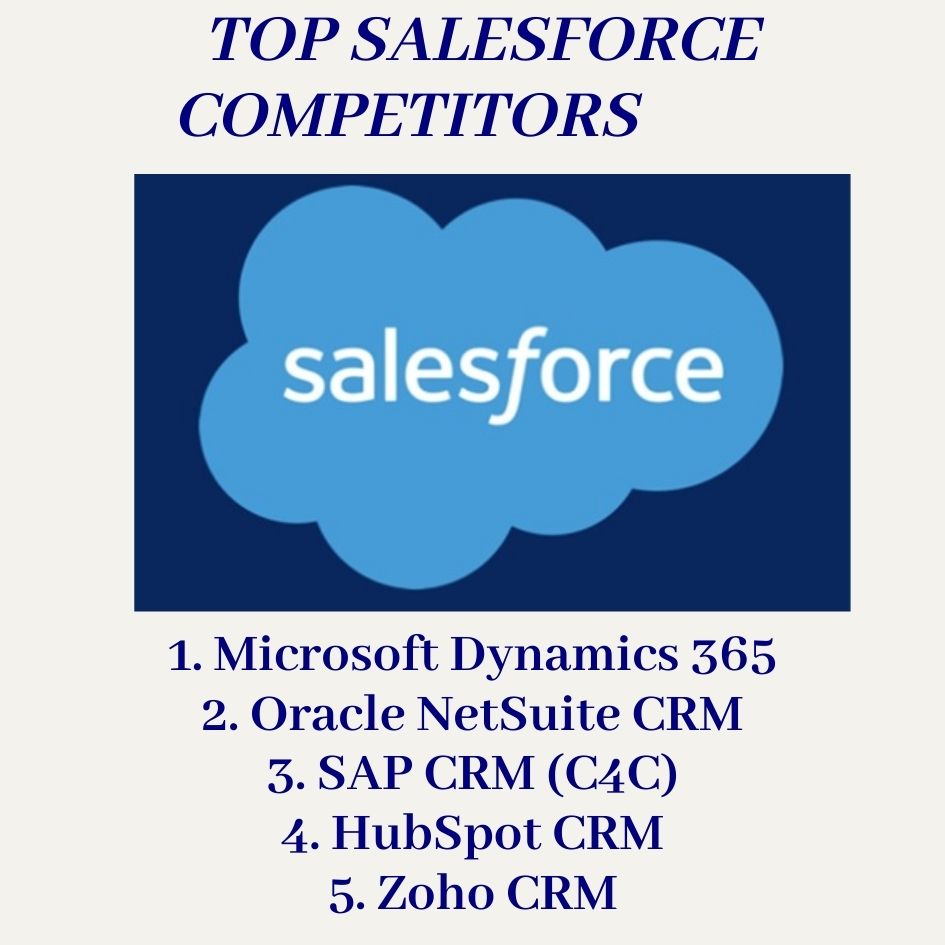
| Feature | Salesforce | Microsoft Dynamics 365 | Oracle NetSuite CRM | SAP CRM (C4C) | HubSpot CRM | Zoho CRM |
| Founded | 1999 | 2016 (Evolution of Dynamics CRM) | 1998 (Acquired by Oracle in 2016) | 1972 (CRM integrated into SAP) | 2006 | 1996 |
| Target Audience | Large enterprises, mid-sized firms | Enterprises, Microsoft users | Mid-sized businesses, e-commerce | Large enterprises, global businesses | Small to mid-sized, marketing-focused | Small to mid-sized, cost-conscious |
| Key Features | Sales, Service, Marketing, Commerce | Sales, Service, Marketing, Finance | Sales automation, marketing, e-commerce | Sales, service, analytics, integration | Sales, marketing, CMS, free CRM | Sales, marketing, AI, affordability |
| Primary Focus | Comprehensive CRM, customization | Microsoft integration | Integrated ERP and CRM | Enterprise-grade, SAP integration | Inbound marketing, ease-of-use | Affordable, user-friendly CRM |
Market Presence and Share
The CRM market shares among Salesforce competitors are approximately as follows:

- Salesforce: Dominant leader, widely adopted across industries.
- Microsoft Dynamics 365: Strong market presence, particularly among Microsoft ecosystem users.
- Oracle NetSuite CRM: Influential in mid-market and e-commerce sectors.
- SAP C4C: Primarily targets large enterprises already using SAP ecosystems.
- HubSpot CRM: Rapid growth, popular among smaller and mid-sized businesses.
- Zoho CRM: Known for cost-effective CRM solutions, favored by budget-conscious businesses.
Service Range Comparison
- Salesforce: Offers extensive services including Sales Cloud, Service Cloud, Marketing Cloud, Commerce Cloud, analytics (Tableau), and robust customization (Apex, Lightning).
- Microsoft Dynamics 365: Provides comprehensive integration across sales, service, marketing, finance, supply chain, and business intelligence (Power BI).
- Oracle NetSuite CRM: Integrates sales force automation, marketing automation, customer service, and ERP solutions, emphasizing e-commerce integration.
- SAP CRM (C4C): Delivers sales, service, marketing, analytics, and deep integration with SAP enterprise solutions.
- HubSpot CRM: Specializes in inbound marketing, offering sales, marketing, service modules, CMS, automation, and a free CRM option.
- Zoho CRM: Focuses on affordability with sales, marketing, service automation, analytics, mobile apps, and integrations.
Strengths and Weaknesses of Salesforce Competitors
Salesforce

- Strengths: Extensive customization, robust ecosystem, market leadership.
- Weaknesses: Higher pricing, complexity for smaller businesses.
Microsoft Dynamics 365

- Strengths: Seamless Microsoft integration, comprehensive enterprise features.
- Weaknesses: Complexity, less flexibility outside Microsoft ecosystem.
Oracle NetSuite CRM

- Strengths: Integrated ERP and CRM, strong e-commerce capabilities.
- Weaknesses: Limited flexibility compared to specialized CRM solutions.
SAP CRM (C4C)
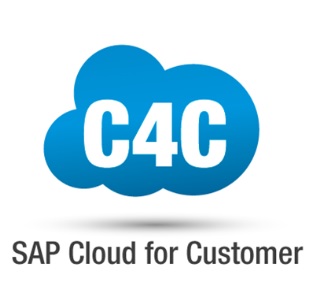
- Strengths: Enterprise-grade features, deep SAP integration, global reach.
- Weaknesses: High complexity, costly, limited appeal beyond existing SAP users.
HubSpot CRM
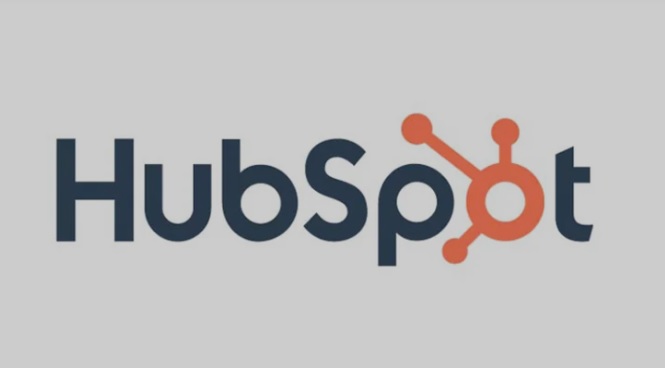
- Strengths: User-friendly, strong inbound marketing capabilities, free CRM option.
- Weaknesses: Less comprehensive for enterprise-level requirements.
Zoho CRM

- Strengths: Highly affordable, easy to use, feature-rich for its price.
- Weaknesses: Smaller ecosystem, fewer customization options.
Key Competitive Factors in Choosing Salesforce Competitors
When evaluating Salesforce competitors, businesses should consider:
- Customization: Adaptability to specific business workflows.
- Integration: Ease of connecting with existing business software.
- Scalability: Capability to grow alongside the business.
- Analytics: Advanced insights and reporting functionalities.
- Ease of Use: Intuitive design and user-friendly interfaces.
- Cost: Value for money and suitable pricing models.
Head-to-Head Comparisons Between the Salesforce Competitors
- Salesforce vs. Microsoft Dynamics 365: Salesforce emphasizes a broad CRM ecosystem, while Dynamics 365 focuses on Microsoft product integration.
- Salesforce vs. HubSpot CRM: Salesforce provides extensive enterprise-level features, whereas HubSpot CRM excels in marketing-centric solutions for smaller businesses.
- Oracle NetSuite CRM vs. SAP C4C: NetSuite targets integrated ERP and CRM solutions for mid-market growth, while SAP C4C appeals to large enterprises deeply invested in SAP systems.
Consumer Preferences by Segment
- Large Enterprises: Prioritize comprehensive solutions, robust customization, and seamless integration.
- Small to Mid-Sized Businesses: Value affordability, ease of use, and efficient marketing integrations.
- Microsoft Ecosystem Users: Prefer Dynamics 365 for seamless Microsoft integration.
- SAP System Users: Opt for SAP C4C due to deep integration capabilities.
Considerations When Choosing Salesforce Competitors
- Evaluate business size, industry-specific needs, and CRM objectives.
- Analyze feature availability, pricing structures, and customer support quality.
Conclusion
The CRM market is highly competitive, with Salesforce maintaining significant dominance. However, Salesforce competitors like Microsoft Dynamics 365, Oracle NetSuite CRM, SAP C4C, HubSpot CRM, and Zoho CRM provide attractive alternatives tailored to various business requirements. By thoroughly understanding the competitive landscape, businesses can select the CRM solution that best aligns with their goals, optimizes customer relationships, and fosters sustainable growth.
FAQ about Salesforce Competitors
Who are the main Salesforce competitors?
The primary Salesforce competitors include:
- Microsoft Dynamics 365
- Oracle NetSuite CRM
- SAP CRM (C4C)
- HubSpot CRM
- Zoho CRM
What makes Salesforce different from its competitors?
Salesforce stands out due to its extensive customization options, robust ecosystem, comprehensive cloud-based solutions, and market leadership. However, its competitors often offer specialized integrations, cost-effective solutions, or streamlined features tailored to specific business sizes or industries.
Which Salesforce competitor is best for small businesses?
HubSpot CRM and Zoho CRM are ideal Salesforce alternatives for small businesses. Both platforms offer user-friendly interfaces, affordable pricing, and essential CRM functionalities suitable for smaller teams and budgets.
Which Salesforce competitor integrates best with Microsoft products?
Microsoft Dynamics 365 is the best Salesforce competitor for businesses heavily invested in the Microsoft ecosystem. It seamlessly integrates with Microsoft Office 365, Teams, Outlook, and other Microsoft applications.
What are the strengths and weaknesses of Oracle NetSuite CRM compared to Salesforce?
Strengths:
- Strong integration of CRM and ERP capabilities
- Ideal for mid-sized businesses, especially in e-commerce
Weaknesses:
- Less flexible customization compared to Salesforce
- Limited appeal outside ERP-focused businesses
Is SAP CRM (C4C) suitable for small and mid-sized businesses?
SAP CRM (C4C) typically targets large enterprises due to its complexity, cost, and deep integration with other SAP products. Small and mid-sized businesses might find solutions like HubSpot CRM or Zoho CRM more suitable and cost-effective.
How do Salesforce competitors compare in terms of pricing?
Pricing varies significantly among Salesforce competitors:
- Salesforce: Premium pricing, suitable for enterprises.
- Microsoft Dynamics 365 and SAP C4C: Higher cost, enterprise-oriented.
- Oracle NetSuite CRM: Mid-range pricing, attractive for growing businesses.
- HubSpot CRM and Zoho CRM: Affordable options, ideal for small to mid-sized companies.
Can Salesforce competitors scale with my business?
Yes, most Salesforce competitors offer scalable solutions. Microsoft Dynamics 365, Oracle NetSuite CRM, and SAP CRM are especially suited for enterprises and growing mid-sized businesses. HubSpot CRM and Zoho CRM also offer scalability but are better suited for small to mid-sized businesses.
Which Salesforce competitor offers the best analytics and reporting tools?
Salesforce (with Tableau integration) and Microsoft Dynamics 365 (with Power BI integration) provide some of the most advanced analytics and reporting features. SAP CRM also offers robust analytics, particularly for enterprises already using SAP products.
How important is ease-of-use when comparing Salesforce competitors?
Ease-of-use is critical, especially for small to mid-sized businesses with limited IT resources. HubSpot CRM and Zoho CRM are known for their intuitive interfaces and straightforward usability, making them popular choices among smaller teams.
What factors should I consider when choosing among Salesforce competitors?
Consider the following factors:
- Business size and scalability needs
- Industry-specific requirements
- Integration capabilities
- Customization options
- Pricing and budget constraints
- Ease of use and user adoption
- Analytics and reporting capabilities
- Quality of customer support and training resources
This FAQ provides essential insights to help businesses understand and evaluate the competitive landscape around Salesforce competitors. If you liked this review, you can also review our article about other Business Services posts here.
